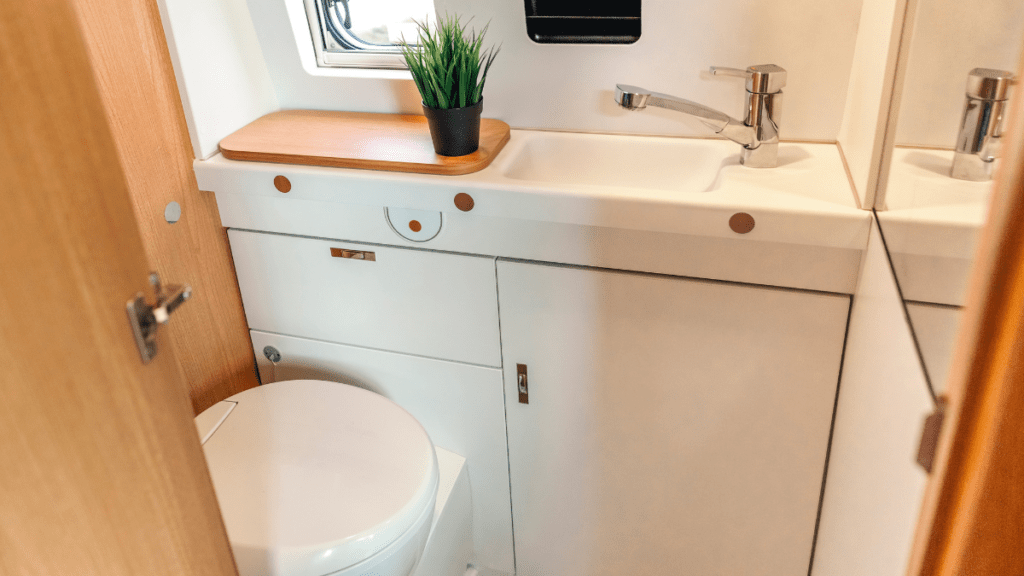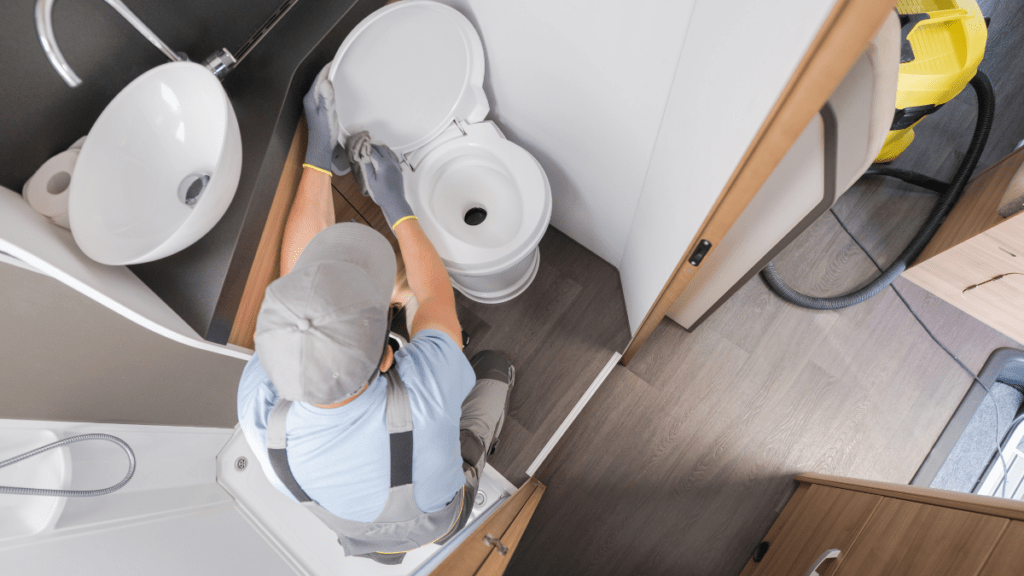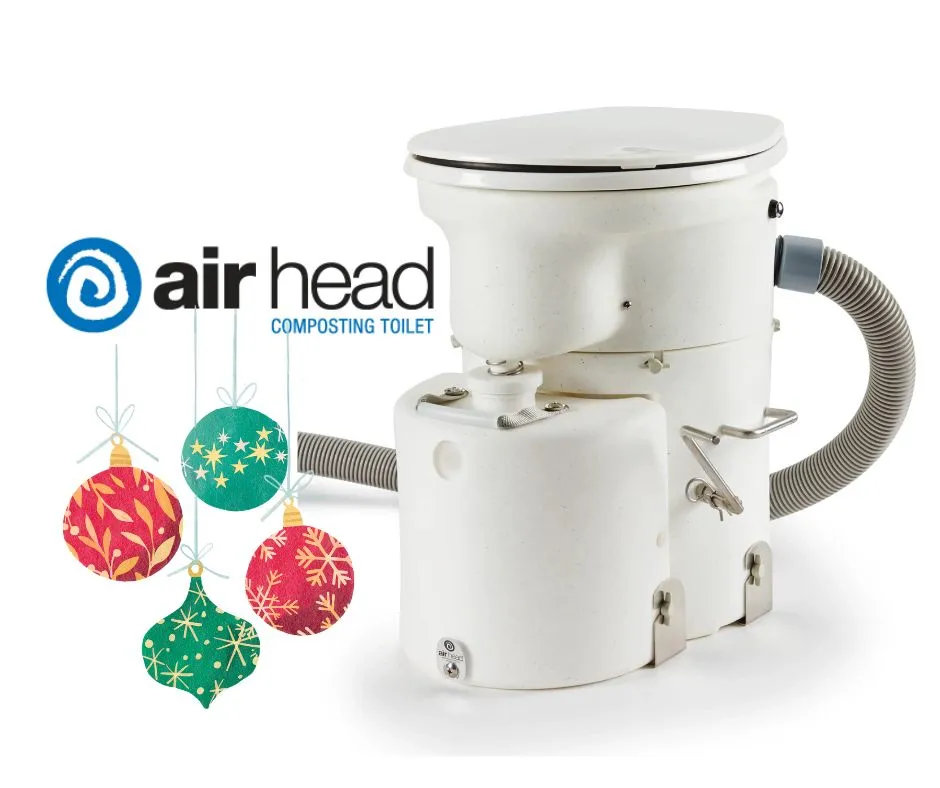
Composting toilets are now becoming much more popular than the older, traditional models when it comes to boats, RVs and even off-grid houses. However, there are many misconceptions associated with composting toilets that might prevent some people from recognizing the overall benefits of using them.
In this article, we’ll take a closer look at some of the more common myths surrounding composting toilets and how such misinformation is easily debunked. In addition to this, we’ll also explain why many seasoned travelers are now choosing to fit their boats and RVs with composting toilets as opposed to traditional pump-operated systems.

Like most people, you might hear the word “composting” and associate it with unpleasant odors that you’d never want to travel with inside your living space. The truth is that composting toilet systems are designed to function with optimal odor control through an advanced system that also removes the usual headaches that are involved in using a traditional toilet system.
A composting toilet is a system engineered to work naturally through aerobic decomposition by efficiently processing waste material. It allows you to enjoy a clean and odor-free living space by utilizing advanced venting mechanisms, providing you with a fresh and comfortable RV experience.
Modern composting toilets operate using ventilation systems that promote airflow and facilitate the decomposition of waste to help minimize any odor buildup. Air Head’s composting toilet models separate liquid and solid waste, which significantly increases odor control and delivers much faster composting times than other brands.
This progressive approach turns waste into a compost that’s easily disposed of, without needing any heavy, bulky tanks, chemicals or pumping systems. Air Head composting toilets are made to provide you with a long term off-grid travel toilet that’s virtually identical to the comfort and simplicity you’ve come to expect from your typical household toilet.

The idea that composting toilets are somehow unsanitary and not as clean as traditional models is just more misinformation and one of the more common composting toilet myths. There’s a good reason why so many people opt for composting toilets after learning how they work compared to older pump-operated designs. Some people believe that composting toilets are unsanitary or unhygienic because of the collection and presence of human waste.
The truth is that composting toilets are much safer and effective in terms of decomposing waste because they use natural microbial processes. The old toilet systems operate using a sizable volume of water to flush and collect waste in large tanks, yet this type of system actually presents more sanitation and hygiene risks due to the fact that your boat or RV is forced to carry around a very heavy load of raw sewage in a large, bulky tank.
Anyone who’s experienced problems with leakage or pump malfunction related to these traditional toilet systems knows how it can turn into a massive problem of having to clean up waste from your RV and the surrounding area that’s been contaminated by the leak. Additionally, draining the black tank requires close contact with raw sewage, which is never a pleasant experience.
There are even more complications when using a traditional toilet system in your boat. The discharge from these systems can cause serious pollution in marine environments. This pollution has been known to cause depleting oxygen, harmful algal blooms and dead zones that are harmful to marine life and humans. There are also many regions that have strict regulations or even prohibit sewage discharge from boats, meaning you might be forced to keep wastewater on board until you’re able to find a suitable discharge location.
Composting toilets produce composted material that is significantly lighter, more likely to be free of harmful pathogens than raw sewage and even suitable for use as fertilizer when fully composted. Having your RV fitted with a composting toilet system like Air Head means you can enjoy long-term stay in areas without waste dumping, which opens up a whole new world of possibilities and destinations. In addition to this, composting toilets are an eco-friendly alternative to these older, water-based systems that won’t pose a risk of contaminating the environment with sewage.

While there is some required maintenance related to using composting toilets, the level of maintenance is often exaggerated and less involved than the upkeep associated with traditional toilet systems. Many modern composting toilets are designed for ease of use and minimal upkeep, and the assumption that these systems are more complex and costly is a prominent composting toilet myth. Air Head Toilets are the leading brand in this regard as they require very little maintenance, making it possible to embark on long-term journeys to virtually anywhere you choose.
Traditional toilets present a litany of maintenance issues that are mostly related to large holding tanks. They also involve very complex pump systems that present multiple points of failure. The most common maintenance issues with pump-operated systems can happen at any time, meaning your trip may be interrupted with a massive cleanup effort and serious mechanical fixes. This often happens at the worst possible times – on passage or usually when guests are due to arrive.
In addition to this, you’ll also have to pay for servicing kits and numerous spare parts that need to be kept on-hand in the event that any part of the system fails. Traditional toilet system tanks must be cleaned regularly, and hoses should also be replaced every few years – adding even more expenses.
The maintenance related to composting toilets typically involves emptying the solids compartment and adding required bulking agents and compost activators as needed. It’s also good to inspect ventilation systems, which may require occasional cleaning to ensure optimal airflow. When compared with traditional systems, the maintenance involved with composting toilets is more easily managed and well worth the effort for the environmental benefits they offer.

The idea that composting toilet systems like Air Head are not suitable for traveling with boats or RVs could not be further from the truth. Composting toilets are actually more suitable for boats or RVs as they offer distinct advantages in terms of less weight and required space, as well as less frequency in emptying while traveling.
Composting toilets are also ideal for remote cabins and eco-friendly homes. Their versatility, lack of maintenance and odor-free use makes them the perfect choice for off-grid living, where access to traditional sewage systems may be significantly limited or nonexistent.
Composting toilets can also be used in any type of housing as they offer an economical alternative to flush toilets in terms of both environmental impact and cost-reduction potential. A composting system greatly reduces water consumption which lowers utility bills, especially for large families. They can also serve as interim sanitation systems in cases where the traditional system is failing.
As composting toilet myths persist, it’s important to separate fact from fiction surrounding their use. Composting toilets are not only odor-free and hygienic but also feature sensible sanitation options that are low maintenance and environmentally sustainable. Air Head highlights the effectiveness and reliability of modern composting toilet technology. The truth of composting toilet systems is that they offer a greener, more sustainable future.

Composting toilets are now becoming much more popular than the older, traditional models when it comes to boats, RVs and even off-grid houses. However, there are many misconceptions associated with composting toilets that might prevent some people from recognizing the overall benefits of using them.
In this article, we’ll take a closer look at some of the more common myths surrounding composting toilets and how such misinformation is easily debunked. In addition to this, we’ll also explain why many seasoned travelers are now choosing to fit their boats and RVs with composting toilets as opposed to traditional pump-operated systems.

Like most people, you might hear the word “composting” and associate it with unpleasant odors that you’d never want to travel with inside your living space. The truth is that composting toilet systems are designed to function with optimal odor control through an advanced system that also removes the usual headaches that are involved in using a traditional toilet system.
A composting toilet is a system engineered to work naturally through aerobic decomposition by efficiently processing waste material. It allows you to enjoy a clean and odor-free living space by utilizing advanced venting mechanisms, providing you with a fresh and comfortable RV experience.
Modern composting toilets operate using ventilation systems that promote airflow and facilitate the decomposition of waste to help minimize any odor buildup. Air Head’s composting toilet models separate liquid and solid waste, which significantly increases odor control and delivers much faster composting times than other brands.
This progressive approach turns waste into a compost that’s easily disposed of, without needing any heavy, bulky tanks, chemicals or pumping systems. Air Head composting toilets are made to provide you with a long term off-grid travel toilet that’s virtually identical to the comfort and simplicity you’ve come to expect from your typical household toilet.

The idea that composting toilets are somehow unsanitary and not as clean as traditional models is just more misinformation and one of the more common composting toilet myths. There’s a good reason why so many people opt for composting toilets after learning how they work compared to older pump-operated designs. Some people believe that composting toilets are unsanitary or unhygienic because of the collection and presence of human waste.
The truth is that composting toilets are much safer and effective in terms of decomposing waste because they use natural microbial processes. The old toilet systems operate using a sizable volume of water to flush and collect waste in large tanks, yet this type of system actually presents more sanitation and hygiene risks due to the fact that your boat or RV is forced to carry around a very heavy load of raw sewage in a large, bulky tank.
Anyone who’s experienced problems with leakage or pump malfunction related to these traditional toilet systems knows how it can turn into a massive problem of having to clean up waste from your RV and the surrounding area that’s been contaminated by the leak. Additionally, draining the black tank requires close contact with raw sewage, which is never a pleasant experience.
There are even more complications when using a traditional toilet system in your boat. The discharge from these systems can cause serious pollution in marine environments. This pollution has been known to cause depleting oxygen, harmful algal blooms and dead zones that are harmful to marine life and humans. There are also many regions that have strict regulations or even prohibit sewage discharge from boats, meaning you might be forced to keep wastewater on board until you’re able to find a suitable discharge location.
Composting toilets produce composted material that is significantly lighter, more likely to be free of harmful pathogens than raw sewage and even suitable for use as fertilizer when fully composted. Having your RV fitted with a composting toilet system like Air Head means you can enjoy long-term stay in areas without waste dumping, which opens up a whole new world of possibilities and destinations. In addition to this, composting toilets are an eco-friendly alternative to these older, water-based systems that won’t pose a risk of contaminating the environment with sewage.

While there is some required maintenance related to using composting toilets, the level of maintenance is often exaggerated and less involved than the upkeep associated with traditional toilet systems. Many modern composting toilets are designed for ease of use and minimal upkeep, and the assumption that these systems are more complex and costly is a prominent composting toilet myth. Air Head Toilets are the leading brand in this regard as they require very little maintenance, making it possible to embark on long-term journeys to virtually anywhere you choose.
Traditional toilets present a litany of maintenance issues that are mostly related to large holding tanks. They also involve very complex pump systems that present multiple points of failure. The most common maintenance issues with pump-operated systems can happen at any time, meaning your trip may be interrupted with a massive cleanup effort and serious mechanical fixes. This often happens at the worst possible times – on passage or usually when guests are due to arrive.
In addition to this, you’ll also have to pay for servicing kits and numerous spare parts that need to be kept on-hand in the event that any part of the system fails. Traditional toilet system tanks must be cleaned regularly, and hoses should also be replaced every few years – adding even more expenses.
The maintenance related to composting toilets typically involves emptying the solids compartment and adding required bulking agents and compost activators as needed. It’s also good to inspect ventilation systems, which may require occasional cleaning to ensure optimal airflow. When compared with traditional systems, the maintenance involved with composting toilets is more easily managed and well worth the effort for the environmental benefits they offer.

The idea that composting toilet systems like Air Head are not suitable for traveling with boats or RVs could not be further from the truth. Composting toilets are actually more suitable for boats or RVs as they offer distinct advantages in terms of less weight and required space, as well as less frequency in emptying while traveling.
Composting toilets are also ideal for remote cabins and eco-friendly homes. Their versatility, lack of maintenance and odor-free use makes them the perfect choice for off-grid living, where access to traditional sewage systems may be significantly limited or nonexistent.
Composting toilets can also be used in any type of housing as they offer an economical alternative to flush toilets in terms of both environmental impact and cost-reduction potential. A composting system greatly reduces water consumption which lowers utility bills, especially for large families. They can also serve as interim sanitation systems in cases where the traditional system is failing.
As composting toilet myths persist, it’s important to separate fact from fiction surrounding their use. Composting toilets are not only odor-free and hygienic but also feature sensible sanitation options that are low maintenance and environmentally sustainable. Air Head highlights the effectiveness and reliability of modern composting toilet technology. The truth of composting toilet systems is that they offer a greener, more sustainable future.






